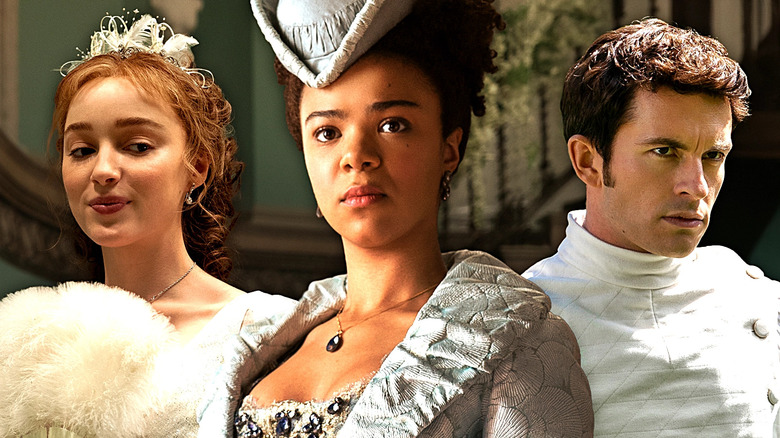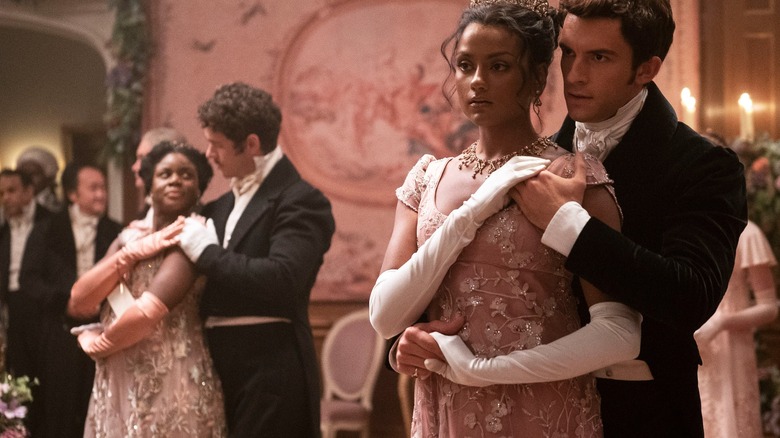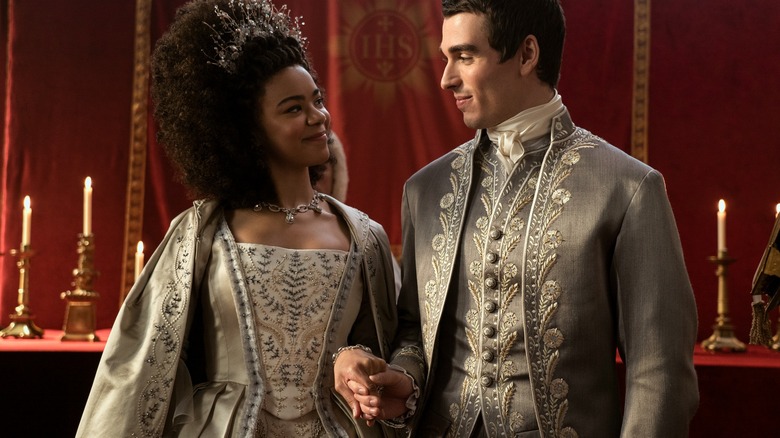The Correct Order To Watch The Bridgerton Shows On Netflix
Shondaland's adaptation of Julia Quinn's "Bridgerton" novel series for Netflix has taken a nuanced approach to the Regency-era romance tale so far. Inclusive reframing of race and sexuality from the source material is baked into the essence of the show, creating a fictional setting that encourages authentic on-screen representation that matters. Being an ongoing series that closely follows the chronological format of Quinn's books, "Bridgerton" is currently gearing up for its fourth season, which plans to focus on Benedict Bridgerton (Luke Thompson) finding lasting love amid immense internal turmoil and societal pressure.
The Netflix series wrapped up its two-part third season in 2024, unfurling the tender yet angst-ridden dynamic between Colin (Luke Newton) and Penelope (Nicola Coughlan), whose friendship blossoms into something more. If "Bridgerton" is able to stick to the one-Bridgerton-sibling-per-season formula (provided that the show doesn't get canceled at some point), we can expect its intended eight-season plan to eventually come to fruition.
The watch order for "Bridgerton" might not be too complicated as it mostly follows a linear pattern, but discerning where the prequel spinoff, "Queen Charlotte: A Bridgerton Story," fits into the timeline can be a tad confusing. Moreover, "Queen Charlotte" juggles dual plotlines: one set in the present that links to the overarching show, and the other beginning in 1761, with a young Charlotte (India Amarteifio) meeting (and marrying) King George (Corey Mylchreest). Without further ado, let us map out the best way to enjoy "Bridgerton," along with everything that the Ton has to offer.
The only correct order for watching Netflix's Bridgerton series
To get the best out of Shondaland's adaptation, follow this watch order:
-
"Bridgerton" season 1 (2020)
-
"Bridgerton" season 2 (2022)
-
"Queen Charlotte: A Bridgerton Story" season 1 (2023)
-
"Briderton" season 3 part 1 (2024)
-
"Bridgerton" season 3 part 2 (2024)
-
"Bridgerton" season 4 (to be released in 2026)
Season 1 of "Bridgerton" establishes the Ton — that is, the members of Regency-era British high society on the show — and how matchmaking invigorates a sense of community while concealing rampant societal ills beneath its surface. Social seasons signify the time for London houses to facilitate balls, lavish receptions, and opportunities for interested suitors to mingle with those "debuting" for matrimony. As seen time and again, personal desires and societal expectations (which are staunchly linked to class-based perception) clash, leading several characters to choose between embracing autonomy and settling for a life of compromise. While the first season centers on Daphne Bridgerton (Phoebe Dynevor) and her search for a suitor, season 2 focuses on her brother Anthony (Jonathan Bailey), who struggles to reconcile familial duty with what his heart desires.
I won't be spoiling the finer details for those who've yet to watch the series, but some core themes in "Bridgerton" are worth dissecting, especially when in terms of the changes made from the source material. In a society where marriage and childbearing as posed as moral obligations, there is very little space for personal freedom. Even so, characters like Benedict and Eloise (Claudia Jessie) pursue paths that are branded "unconventional" by societal norms (and in some cases, completely frowned upon). This complexity is mostly absent in Quinn's novels, which take a more traditional, heteronormative approach to their central romances and skip over scrutinizing the hypocrisy of the Ton to the extent that the "Bridgerton" TV show does.
Circling back to the watch order — once you're done with the first two seasons of "Bridgerton," it's time for "Queen Charlotte," which unravels an enduring love story both beautiful and tragic.
Queen Charlotte is essential to understanding what Bridgerton stands for
As seasons 1 and 2 provide us with a solid foundation for Queen Charlotte (Golda Rosheuvel) in the present timeline, the prequel spin-off fits snugly right after this point. The older queen, who rules with self-assured elegance, has been viewed solely through an impersonal lens so far, but "Queen Charlotte" acquaints us with her true heart. Her marriage with George was one of convenience and obligation, but the two develop an intense, organic love that is able to weather the fiercest storms despite societal pressures attempting to pull them apart. Charlotte's character evolves like a rich tapestry, woven along every role she is supposed to play, yet the threads lead back straight to who she truly is beneath facades of aloof strength.
After you're done with the spin-off, you should watch the entirety of "Bridgerton" season 3, which is divided into two parts for no real purpose beyond having the first half end with a cliffhanger. Apart from focusing on the central relationship, the third season gets to the bottom of the Lady Whistledown problem, explores the fine line between gossip and public character assassination, and highlights the hopelessness that pervades young women who are forced to marry. In between extravagant balls and classical renditions of popular tracks, worlds of broken dreams and earnest promises are exchanged, with some characters yearning for choices they have yet to make.
While you wait for season 4, you can read Quinn's novel series, especially "An Offer from a Gentleman" and "To Sir Phillip, With Love," which explore Benedict and Eloise's stories respectively. As their series counterparts are markedly unalike, it remains to be seen how the two versions converge and differ, and whether the Netflix series dares to alter canonical expectations to give the pair of them stronger, better arcs.


